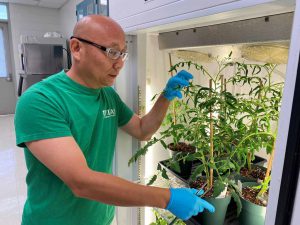Farmers around the world face unique challenges in their effort to provide abundant, safe and flavorful food. One often overlooked issue for farmers is climate change.
“The environment has a huge impact on plant health and reproduction,” said Alfred Huo, UF/IFAS assistant professor of plant breeding. “Plants respond to environmental cues, like temperature, to flower and reproduce in an adaptive manner. Temperatures can affect seed development through posing effects on their mother plants, resulting in seeds with varied quality – some will germinate and grow, and some will not. Farmers and growers expect uniform seed quality, but variable quality due to environmental factors like high temperature cause poor plant population establishment and farmers experience big economic losses.”

“Seed quality and plant vigor are heavily dependent on where the seed was produced and can be inconsistent,” Huo said. “Seeds produced in Chile are very different than those produced in Mexico or Canada. Seed germination rate and vigor varies a lot based on the seeds’ origin and can impact farmers greatly. We try to understand why and how genetic and environmental factors, like temperature, impact seeds to help bring consistency to farmers.”
The $1.1 million Foundation for Food and Agriculture grant, awarded to Huo at the UF/IFAS Mid-Florida Research and Education Center (MREC) and three other leading scientists at the University of California, Davis, allows researchers to examine how rising temperatures impact development of tomato fruit and seeds. Producers of fresh market and processing tomatoes will have higher quality seeds for establishing their crops as a result of this project.
“Each researcher involved in this project has a different objective,” he said. “The principal investigator of this project, Kent Bradford, professor at UC Davis will work on seed physiology; another will work on how temperature affects tomato fruit development and the third will examine the effect of temperature on pollen viability and pollination of tomatoes. At UF/IFAS, we will investigate how small RNAs – a type of short, tiny nucleotides – are responsive to different temperatures experienced by the mother plant during seed development.”
“Field grown tomato crops are often established from transplanted seedlings,” Huo said. “Nurseries and transplant growers will also benefit from our study through greater seedling vigor and uniformity, which greatly increases their operational efficiency. From our research, seed companies will better understand how the genetics of their cultivars and variable growing conditions during seed production interact to influence the quality of seeds produced.”
This study will enable more efficient production of high-quality seeds and is critical for maintaining high yields as temperatures increase in agricultural regions, he said.
“This investigation into teasing out how high temperatures affects seed quality, and how it can be manipulated, is fundamental to our ability as a society to produce enough to feed more than seven billion people in a hotter world,” said Roger Kjelgren, UF/IFAS MREC director.
This is an expansion of Huo’s current research, supported by a $420,000 USDA grant to study the same concerns with lettuce. Temperature has a significant impact on lettuce flowering, seed production and seed germination as well.
“We hope that we can identify some interesting small RNAs and examine their function in controlling seed quality,” he said. “We then develop practical application approaches for seed companies, growers and the nursery industry to control plant development and seed production for consistent results.”
“As we face the challenge of global climate change, increasing temperatures will exceed the optimal limits of many crop species, requiring breeders and molecular biologists to expand those limits,” Huo said. “Climates favorable for specific crops will shift to new locations, creating problems for seed and crop production. By understanding in greater detail how environmental signals are perceived by the mother plant and transmitted to the seed, it will be possible to more quickly adapt seed production to changing conditions and maximize seed quality.”
 0
0
